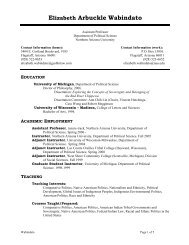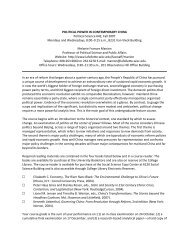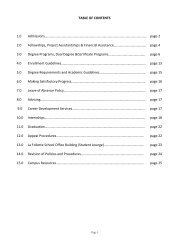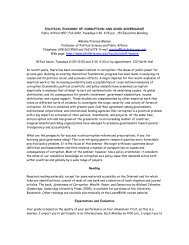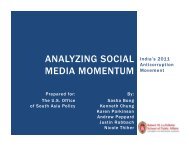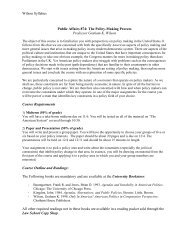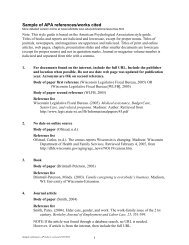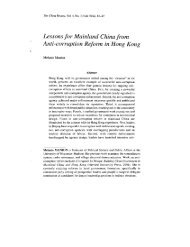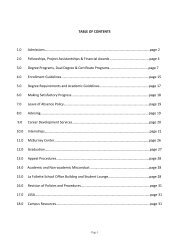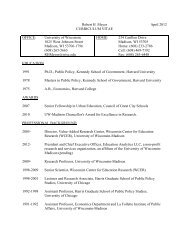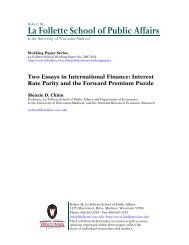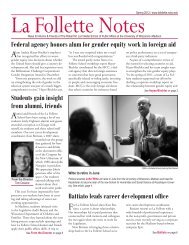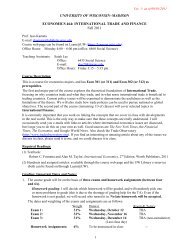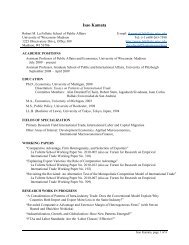SAVE Commission's findings - La Follette School of Public Affairs ...
SAVE Commission's findings - La Follette School of Public Affairs ...
SAVE Commission's findings - La Follette School of Public Affairs ...
You also want an ePaper? Increase the reach of your titles
YUMPU automatically turns print PDFs into web optimized ePapers that Google loves.
Text<br />
The number before the decimal refers<br />
to the Goal number. The number<br />
after the decimal refers to its order<br />
within the Goal section.<br />
The voice <strong>of</strong> a Commission<br />
member or citizen.<br />
APPENDICES<br />
APPENDIX A<br />
Enumerated<br />
Actions<br />
CHAPTER 1: CITIZENS WITH GREAT CAPACITY<br />
GOAL #1: (PREAMBLE) COMMITTED<br />
CITIZENSHIP<br />
1.1<br />
Conduct a citizen responsibility dialogue. To<br />
celebrate Wisconsin’s sesquicentennial, debate<br />
the responsibilities and rights <strong>of</strong> citizenship,<br />
focused on the development <strong>of</strong> a “Bill <strong>of</strong> Citizen<br />
Responsibilities” to go with the Bill <strong>of</strong><br />
Rights.<br />
1.2<br />
Use technology to promote citizen involvement.<br />
To revive committed citizenship in a<br />
high-tech age, create increased opportunities<br />
for citizens to take part in government at all<br />
levels by using high-tech communications<br />
tools provided through the new <strong>Public</strong> Information<br />
Utility.<br />
1.3<br />
Promote volunteerism. To reinforce<br />
Wisconsin’s neighborliness, a culture <strong>of</strong> volunteering<br />
should be revived and recognized<br />
in all communities. Given the proper climate,<br />
protections and removal <strong>of</strong> barriers, the people<br />
have a capacity to help each other without<br />
expert intervention.<br />
1.4<br />
Find neutral ground to reduce distrust and<br />
resolve conflicts. To counter distrust, contentiousness<br />
and fragmentation found among<br />
various Wisconsin interests, consider designating<br />
“neutral ground” that provides an opportunity<br />
for factions that distrust each other to<br />
have a positive discussion. This will require a<br />
place or places that are neither state nor local,<br />
young nor old, black nor white, tribal nor nontribal,<br />
public nor private. The location is a place<br />
for mediation, negotiation, conflict resolution<br />
and planning.<br />
1.5<br />
News media should nurture civic debate. To<br />
promote informed and productive discussion<br />
<strong>of</strong> public issues, the news media should reject<br />
personality, conflict-driven journalism in favor<br />
<strong>of</strong> civic journalism.<br />
GOAL #2: EFFECTIVE LEADERS<br />
2.1<br />
Develop a <strong>Public</strong> Leadership Institute and network.<br />
To create a government that helps build<br />
the capacity <strong>of</strong> its workers and citizens and a<br />
citizenry involved in public service, create a<br />
<strong>Public</strong> Leadership Institute and network to<br />
help full- and part-time leaders better advance<br />
their skills as they advance and continue in<br />
government service.<br />
2.2<br />
Incorporate a leadership philosophy in the<br />
management system. To ensure enduring<br />
change and continuous improvement, unequivocally<br />
incorporate a leadership philosophy<br />
in Wisconsin’s entire system <strong>of</strong> government.<br />
A leadership government emphasizes<br />
results and partnerships, visionary thinking<br />
and quality management, rather than process<br />
and control.<br />
2.3<br />
Prepare managers as mission-driven leaders.<br />
To achieve a mission-driven organization, and<br />
as part <strong>of</strong> the flattening <strong>of</strong> the hierarchy, train<br />
middle management in leadership and coaching.<br />
Managers will translate vision into outcomes<br />
and work tasks in a changing world <strong>of</strong><br />
ambiguous authority where employees and<br />
employer are a team.<br />
GOAL #3: NEW WISCONSIN IDEA<br />
3.1<br />
Link the Department <strong>of</strong> Development and UW<br />
System for economic development. To seize<br />
the competitive moment in the knowledge<br />
economy, the Department <strong>of</strong> Development<br />
should use the UW as an ongoing resource in<br />
the implementation <strong>of</strong> a strategy to use the<br />
state’s knowledge capacity to generate wealth<br />
from global markets (see Goal #9).<br />
3.2<br />
Create a state dialogue to reinvent citizenship.<br />
To create a new citizenship ideal, the<br />
entire state should join in an effort to reinvent<br />
citizenship, including a citizenship ethic and<br />
60 CITIZEN • C OMMUNITY • G OVERNMENT— WISCONSIN: THE21 ST C ENTURY<br />
WISCONSIN’S “THIRD SECTOR”<br />
In addition to public and private sectors,<br />
there is a third sector with untapped capacity.<br />
The third sector involves a myriad <strong>of</strong> civil enterprises:<br />
religious, educational, voluntary, business,<br />
labor and charitable organizations. These<br />
are the voluntary associations<br />
unique to our<br />
culture but which all<br />
too <strong>of</strong>ten are pushed<br />
into the shadows by formal<br />
government with<br />
bureaucratic programs.<br />
There is no way<br />
government can, or<br />
even should, meet all<br />
needs, just as there is no<br />
way the helpless should<br />
be abandoned by government<br />
in a civil society. The Commission<br />
asked questions about what government should<br />
and should not do and if “it” still needed to be<br />
done, who would do it? The third sector may<br />
have some answers.<br />
Wisconsin can build on the citizenship<br />
principles shared through the <strong>Public</strong> Leadership<br />
Institute and network to find new opportunities<br />
for self-reliant activity in many subjects<br />
and at many levels (see Goal #4). Leaders and<br />
taxpayers also will have the fiscal information<br />
needed to make better decisions on who can<br />
best do the job at every level (see Goals #5 and<br />
#16).<br />
“Think about bold goals for the<br />
sesquicentennial in 1988.<br />
Perhaps a new charter between<br />
the state and people.<br />
Something big.”<br />
David Prosser, Legislator<br />
NOTICEABLY BETTER DIALOGUE<br />
For citizens to have confidence in the system<br />
they have to participate in it. Using new<br />
tele-democracy technology provided by the<br />
Information Utility, citizens will have new opportunities<br />
to access all levels <strong>of</strong> government,<br />
as well as their neighborhoods,<br />
through free<br />
computer networks.<br />
Citizens will debate issues<br />
by electronic town<br />
meetings and solve<br />
common problems<br />
through video conferences.<br />
Who will frame<br />
the questions and lead<br />
the dialogue? That is<br />
the elected <strong>of</strong>ficial’s responsibility.<br />
In the old way, the <strong>of</strong>ficial and government<br />
employee made (<strong>of</strong>ten excessive)<br />
promises and delivered programs. The new way<br />
has the citizen sharing responsibility (see Goal<br />
#4) and the elected <strong>of</strong>ficial realistically framing<br />
expectations through programs that have measurable<br />
results.<br />
The role <strong>of</strong> the media will change. It will<br />
independently and thoughtfully raise public<br />
agenda issues and report the debate in a way<br />
that rejects personality-driven reporting that<br />
now focuses on conflict over consensus. The<br />
transformation to this so-called civic journalism<br />
approach that looks in-depth at public issues<br />
will challenge politicians to be thoughtful<br />
and the media to be responsible.<br />
Actions<br />
1.1<br />
Conduct a citizen<br />
responsibility dialogue.<br />
1.2.<br />
Use technology to<br />
promote citizen<br />
involvement.<br />
1.3.<br />
Promote volunteerism.<br />
1.4.<br />
Find neutral ground to<br />
reduce distrust and<br />
resolve conflicts.<br />
1.5.<br />
News media should<br />
nurture civic debate.<br />
Daniel J. Katers,<br />
Green Bay<br />
“Voter apathy is a<br />
disgrace. We have failed<br />
to stress the importance<br />
<strong>of</strong> participation in<br />
government.”<br />
Succinct description <strong>of</strong> actions<br />
recommended by the Commission.<br />
Further information can be found in<br />
Appendix A, in selected documents<br />
identified in Appendix F, and support<br />
readings in Appendix G.<br />
R E S U L T S<br />
Moving to<br />
citizenship will:<br />
1 Make the process <strong>of</strong> state<br />
government more accountable<br />
to citizens.<br />
2 Make the employees <strong>of</strong> the<br />
State <strong>of</strong> Wisconsin more aware<br />
<strong>of</strong> characteristics, beliefs and<br />
perspectives <strong>of</strong> citizens.<br />
3 Make state government more<br />
flexible, productive and<br />
respectful in its interactions with<br />
citizens.<br />
4 Make the products and<br />
character <strong>of</strong> Wisconsin<br />
government reflect the<br />
responsibilities as well as the<br />
needs and rights <strong>of</strong> citizens.<br />
5 Renew the compact between<br />
citizen and government and<br />
increase the impact citizens<br />
have on government.<br />
6 Make government more cost<br />
effective in the long run due to<br />
more citizen involvement and<br />
volunteerism. It will provide<br />
taxpayers the services they are<br />
willing to pay for as well as what<br />
they want.<br />
7 Establish the preconditions for<br />
the ongoing reinvention <strong>of</strong> state<br />
government, driven by continual<br />
citizen interaction.<br />
Compelling results <strong>of</strong> the actions<br />
envisioned for the bottom-line<br />
minded person. Results will reflect<br />
saving money, solving problems or<br />
enhancing the capacity <strong>of</strong> the state to<br />
move into the 21st Century.<br />
CITIZEN •C OMMUNITY • G OVERNMENT— WISCONSIN: THE21 ST C ENTURY 13<br />
CITIZEN • COMMUNITY • GOVERNMENT — WISCONSIN: THE 21 ST CENTURY 11



